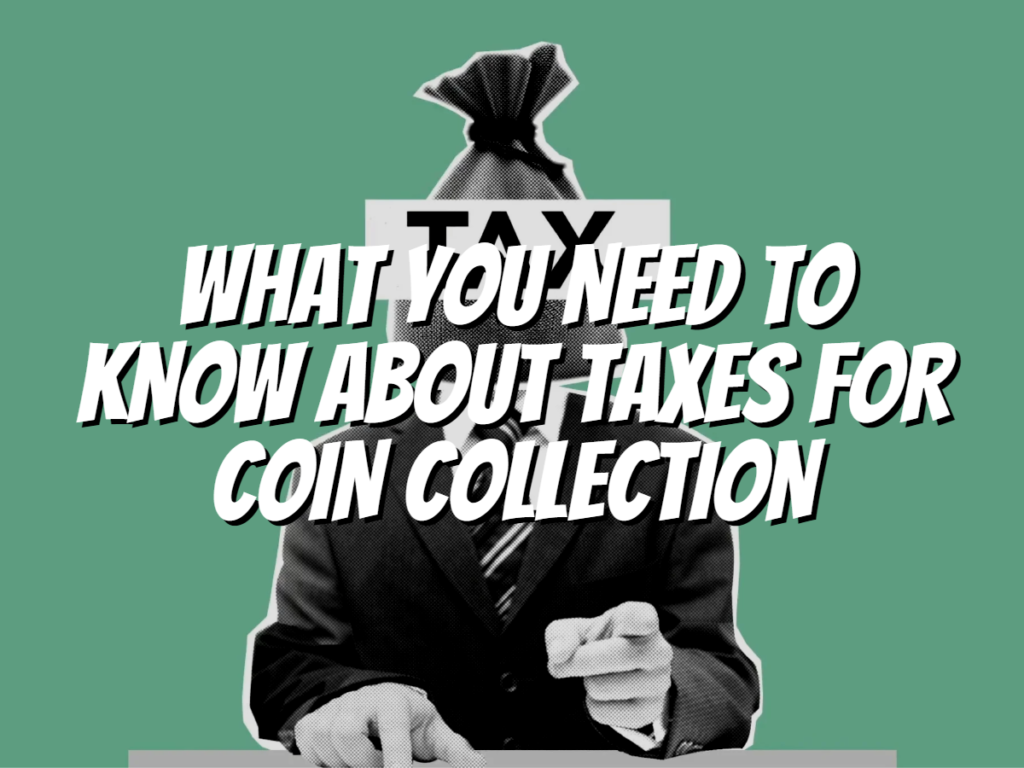I wanted to share with you some information about taxes for coin collection. This guide will cover everything you need to know.
Did you know that if you’ve been collecting coins, your coin collection is one of the most valuable assets you can have?
If you’re thinking of starting a coin collection, I wanted to share some tax-related information that may be helpful.
Taxes for Coin Collection:
Coins Collected as Investment

Selling your coins or bullion for a profit is a capital gain. For this, you need IRS Form 8949. (Sales and Other Dispositions of Capital Gains).
Regardless of whether you received 1099 is unimportant (B). However, suppose you have a profit from the conversion of capital investments that were not held for business purposes.
In that case, you must document the sales or exchange of that asset on another schedule. The total loss or profit from deals reported on Form 8949 is calculated using Schedule D.
If you paid a service charge when you bought the coin, that amount would be deducted from your gain.
Grading fees, travel costs to coin shows, and storage costs, such as the cost of a safe to safeguard your coins, are just a few additional costs that may be tax deductible.
You can find deductions on your Schedule D.
- In case #1, if you bought an ounce of gold coin for $400 in 2005 and sold it for $1,900 in 2011, you would be subject to a $1,500 gain and a 28% tax.
- In case #2, the cost would be equal to the face value of the coins if you merely collected coins that were already in circulation. If you removed 100 coins containing 90% silver from circulation and later sold them for $2,000, your gain would be $1,900. The price of gifts you receive is the same as the price they incurred for the giver.
The gain from selling rare coins can be offset by rare coins acquired under the Like-Kind Exchanges regulations, which is one exception to paying taxes on selling precious metals.
Silver and gold are exchanged for each other in bullion sales according to the same regulations.
However, some particular regulations and deadlines apply. It is best to consult a tax attorney for guidance.
Coins Collected as a Hobby

If you are an avid coin collector who has been collecting coins for many years, your collection has grown to be substantial. If so, some of your coin collecting may be subject to tax.
The IRS considers collecting or exchanging collectible coins as an investment property.
As such, they are taxed if they are not properly reported on your tax return.
In this instance, any profits from selling or exchanging coins would be considered capital gains and taxable at rates based on your ordinary income tax rate (not the lower long-term capital gain rate).
Losses from an activity that is a hobby cannot be used to reduce other income. You must report income from coin sales profits on Line 21 of your 1040 (Other Income).
When coins collected for a hobby are claimed as part of your Schedule A, deductions are significantly more constrained.
Taxes on Inherited Coins

Federal estate taxes are subject to well-established regulations. The relevant state laws typically determine state taxes on inheritance.
The value of the coins at the time they are inherited determines the base/cost price if coins are inherited through an estate.
This is a valid justification for getting the coins valued at this time. Before the coins are sold, income tax is not paid.
For example, if a coin is inherited with a value of $1,000 and is later sold for $1,100, the gain is only $100.
There is a benefit if you leave your coins as a part of your estate when deciding between selling your coins and leaving money to your heirs instead of your coins.
For example, you are responsible for $18,000 in gain if you purchased your collection for $2,000 and sold it for $20,000.
However, if your collection is left to your heirs as part of your estate, is valued at $20,000, and is sold for $20,000, then your heirs are not liable for paying taxes on any gains.
Before you go…
The bottom line is that if you collect coins as an investment, your taxes will be different than if you are a coin collector who enjoys the hobby. Knowing how much profit or loss comes from them is essential if you inherit coins. Before we part ways, check out these articles that can easily help you with your coin collection!
Check out my next article: “An Easy Guide: Are Coin Collection Taxable?“
Related Articles:

